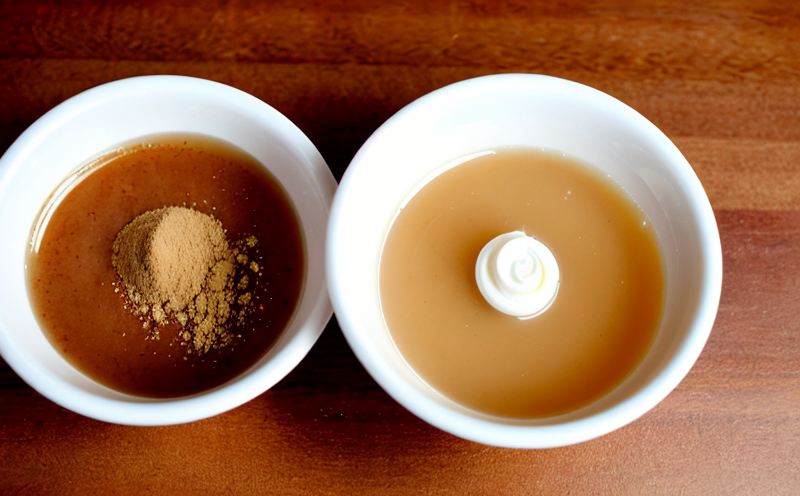ASTM D4806 Ethanol Flavor and Impurity Testing
The ASTM D4806 standard provides a method to evaluate the flavor of ethanol samples by determining the presence and concentration of specific impurities that can alter or mask the intended taste. This service is critical for industries reliant on high-quality, pure ethanol, such as beverage manufacturers, pharmaceutical companies, and laboratories involved in alcohol-based products.
The testing protocol outlined in ASTM D4806 is designed to ensure that the flavor profile of ethanol remains consistent with expected standards. Deviations from these standards can lead to unacceptable taste profiles or even safety concerns if impurities are present at levels that could be harmful when consumed. By adhering to this standard, laboratories and manufacturers can maintain product integrity and customer satisfaction.
The process involves several key steps, including sample preparation, analysis using gas chromatography, and interpretation of results. The sample must first be prepared according to the specified procedure in ASTM D4806, which may include dilution or concentration depending on the initial ethanol content. Once prepared, the sample is analyzed for its flavor characteristics through sensory evaluation by trained personnel.
The analytical phase primarily focuses on identifying and quantifying impurities using gas chromatography techniques. This method allows for precise detection of volatile compounds that can affect the overall flavor profile. The results from this analysis are then compared against predefined thresholds to determine compliance with industry standards.
ASTM D4806 also includes criteria for acceptable levels of various impurities, such as esters, aldehydes, and ketones, which could influence the taste or aroma of ethanol-based products. These limits ensure that any commercial product meets consumer expectations regarding its sensory attributes.
The importance of this service cannot be overstated given the role that pure ethanol plays in numerous sectors including healthcare (alcohol hand sanitizers), food & beverage production (spirits, liqueurs), and cosmetics (perfumes). Ensuring compliance with ASTM D4806 helps to safeguard brand reputation by delivering consistent quality products free from undesirable flavors or impurities.
Compliance with this standard is mandatory for many regulatory bodies worldwide. Non-compliant batches can face severe consequences ranging from product recalls to legal action depending on the severity of non-conformity found during testing.
Why It Matters
The integrity and quality of ethanol are paramount in various industries where it serves not only as a fuel but also an essential ingredient. For instance, in the beverage industry, poor-quality ethanol can result in off-flavors that detract from the overall taste experience. Similarly, in pharmaceuticals or cosmetics containing alcohol-based components, impure ethanol could lead to adverse reactions or ineffective formulations.
By ensuring compliance with ASTM D4806, manufacturers and laboratories can uphold their commitment to delivering high-quality products that meet both regulatory requirements and customer expectations. This adherence also contributes positively towards maintaining industry trust and fostering consumer confidence.
In summary, implementing ASTM D4806 ethanol flavor and impurity testing ensures not only product safety but also enhances brand reputation by consistently providing reliable results across all batches produced under stringent quality controls.
Scope and Methodology
| Aspect | Description |
|---|---|
| Sampling Procedure | The sampling should represent the entire batch or sample lot. A minimum of 1 liter of ethanol is required for analysis. |
| Sample Preparation | Dilution or concentration may be necessary based on initial alcohol content, ensuring the final volume is suitable for GC analysis. |
| Analytical Methodology | Gas Chromatography (GC) with FID detection is used to identify and quantify volatile compounds affecting flavor. Peak identification and quantification are performed using known standards. |
| Acceptance Criteria | The presence of impurities within specified limits ensures compliance with ASTM D4806. |
The methodology described in ASTM D4806 is designed to provide accurate and reliable data on the flavor profile of ethanol samples. It involves careful sample preparation followed by sophisticated analytical techniques aimed at detecting even trace amounts of impurities that could impact the sensory attributes of the product.
Compliance with these strict procedures ensures that results are consistent, repeatable, and scientifically sound. This approach is essential for maintaining high standards in an industry where slight deviations can have significant implications on final product quality.
Industry Applications
- Beverage Industry: Ensuring flavor consistency across different batches of alcoholic beverages.
- Pharmaceutical Sector: Guaranteeing the purity and taste acceptability of alcohol-based medications.
- Cosmetics Manufacturing: Maintaining the quality standards required for perfumes and other skin care products containing ethanol.
- Laboratories: Providing consistent results when testing various samples requiring ethanol as a solvent or reagent.
- Healthcare Providers: Ensuring that hand sanitizers meet safety and efficacy requirements through rigorous quality control measures.
The wide range of applications underscores the versatility and importance of ASTM D4806 in ensuring consistent product performance across diverse fields. By adhering to this standard, organizations can ensure their ethanol products consistently meet the required flavor profiles and comply with relevant regulations globally.





